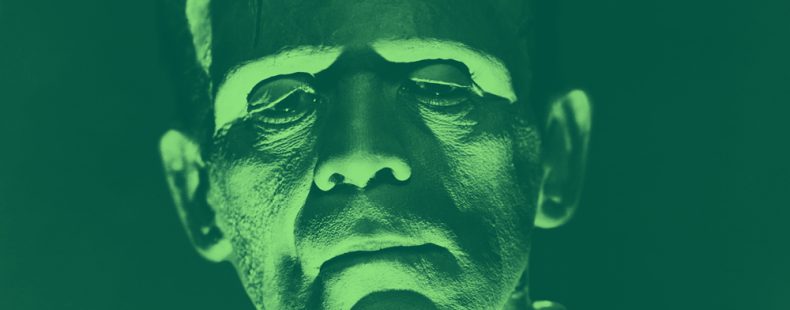In 2012, as Halloween quickly approached, a Frankenstorm was sneaking up on the East Coast. Forecasters were calling the hurricane headed for New York, New Jersey, and as far inland as Ohio, “Frankenstorm” because (like the monster in Mary Shelley’s 1818 novel Frankenstein or The Modern Prometheus) this storm was stitched together from three different weather systems, Hurricane Sandy from the Caribbean, a western early winter storm, and a cold influx of Arctic wind from the north.
So does that mean the monster was also stitched together from three different things? Let’s see what Frankenstein actually means and why the prefix Franken- doesn’t really mean monster.
What does Frankenstein mean?
In German, the name Frankenstein translates to “stronghold of freemen,” most likely referring to various castles and battlements around the country that also carry the name.
Mary Shelley however, believed the name came to her in a vivid dream. In Shelley’s novel, Dr. Victor Frankenstein never names his creation. Instead he disowns the monster by refusing to name it, referring to it as “demon,” “thing,” “wretched devil,” and a long list of awful aliases.
Fear not, meteorologists: you are not alone in the inaccurate “Franken-” ascription! With terms like “Frankenbike” (a bicycle pieced together from scavenged parts), “Frankenfood” (slang for genetically modified crops), “Frankenbite,” (a sound bite that’s been synthesized from many disparate quotations), or even Tim Burton’s film Frankenweenie about a dog brought back to life with electricity, the public loves to “Frankenize” words.
WATCH: What Does "R.I.P." Stand For?
What would Dr. Frankenstein think?
Whether or not Mary Shelley is turning in her grave, the fictional Dr. Frankenstein is definitely turning in his. Regardless of accuracy, the media has chosen to ignore the good doctor’s wishes and now Frankenstein’s monster bears his family name in popular culture, sewing the prefix onto the vernacular like the creature’s salvaged limbs.
What words would you like to Frankenize? We recommend grabbing a copy of Mary Shelley’s Frankenstein and a mug of hot cocoa to weather the Frankenstorms with the original source.
One haunting read deserves another, and if you enjoy the chilling experience of Frankenstein, then you probably have taken a bite out of Bram Stoker’s bloodcurdling novel as well. But do you know where the word Dracula comes from?














